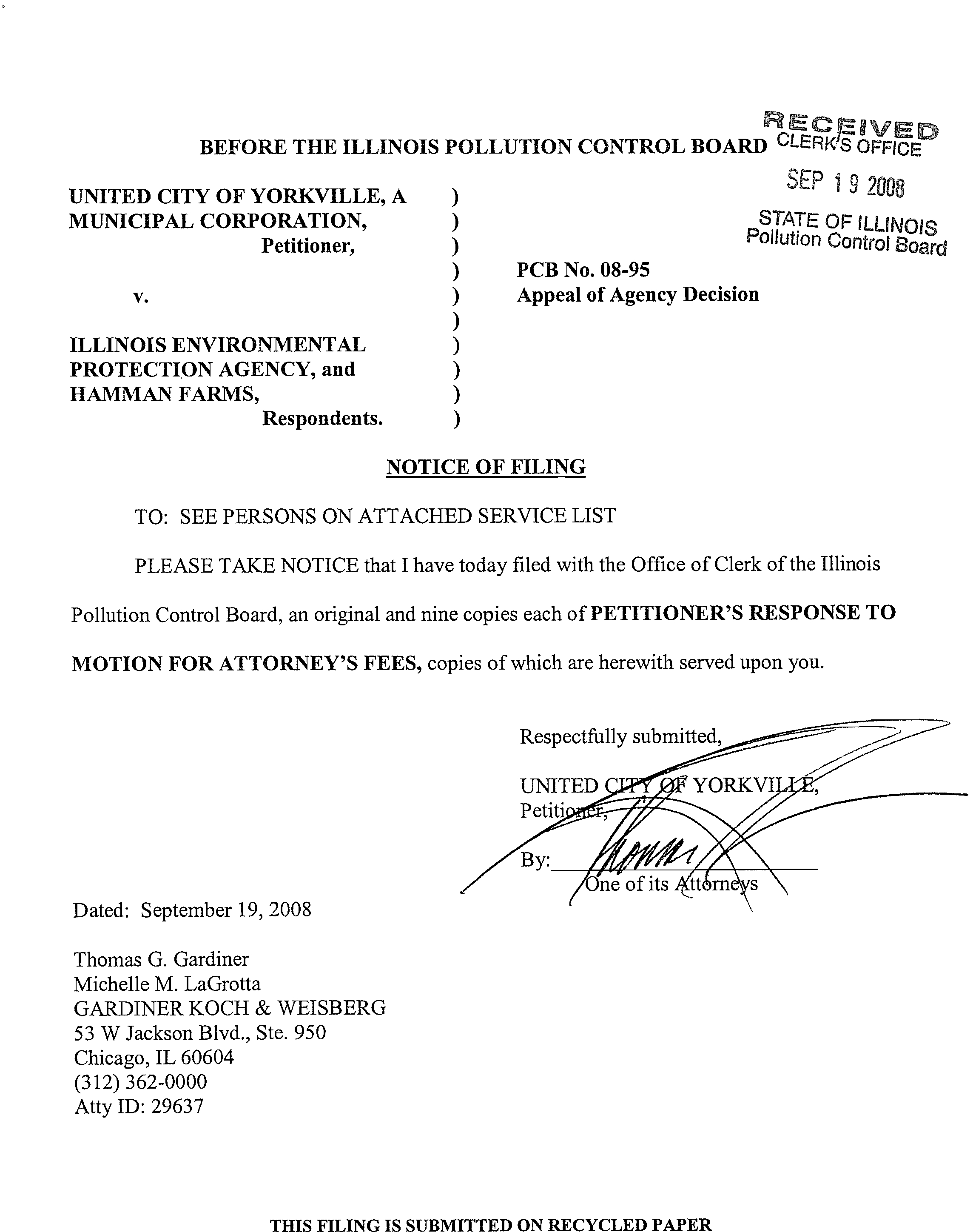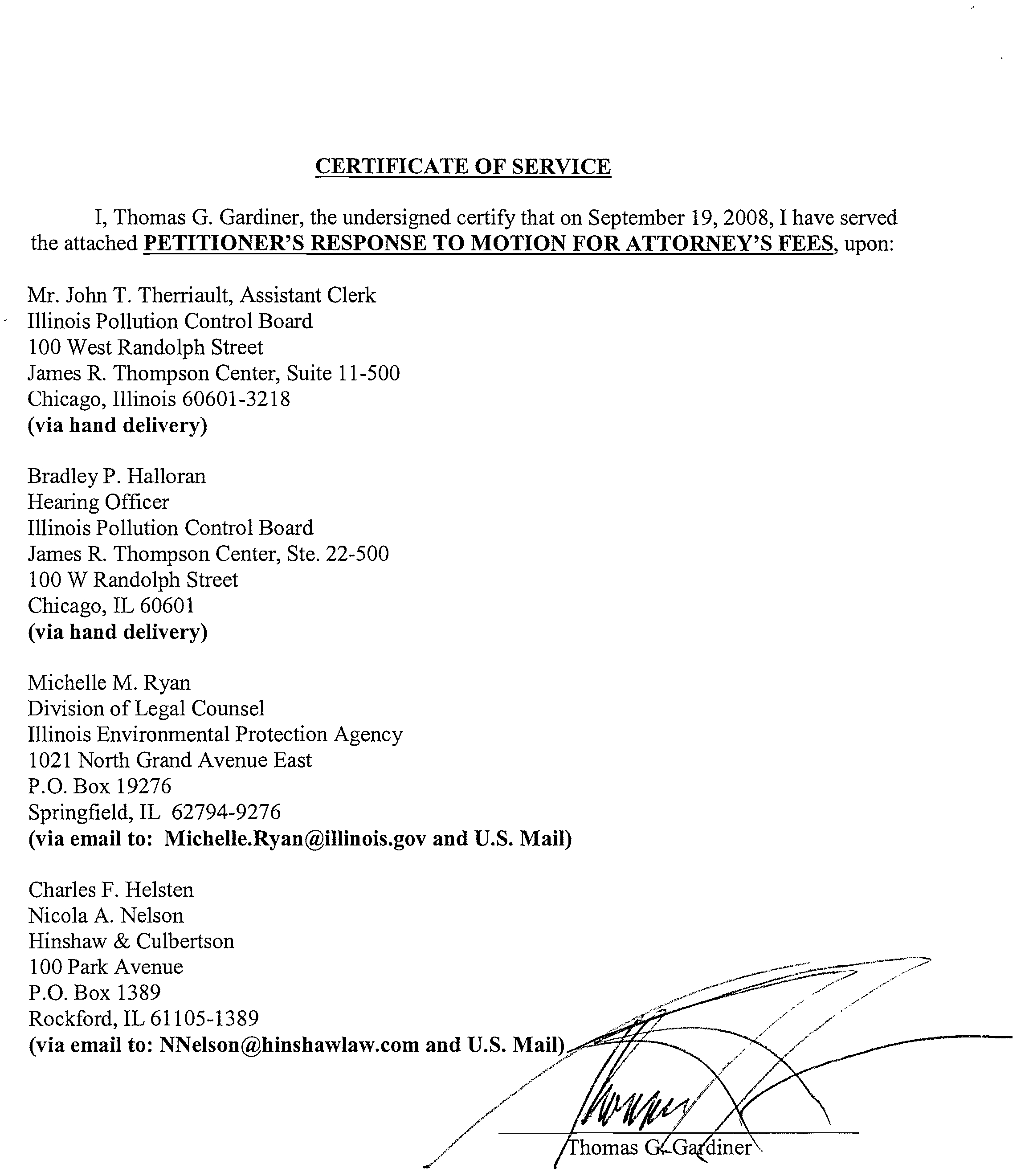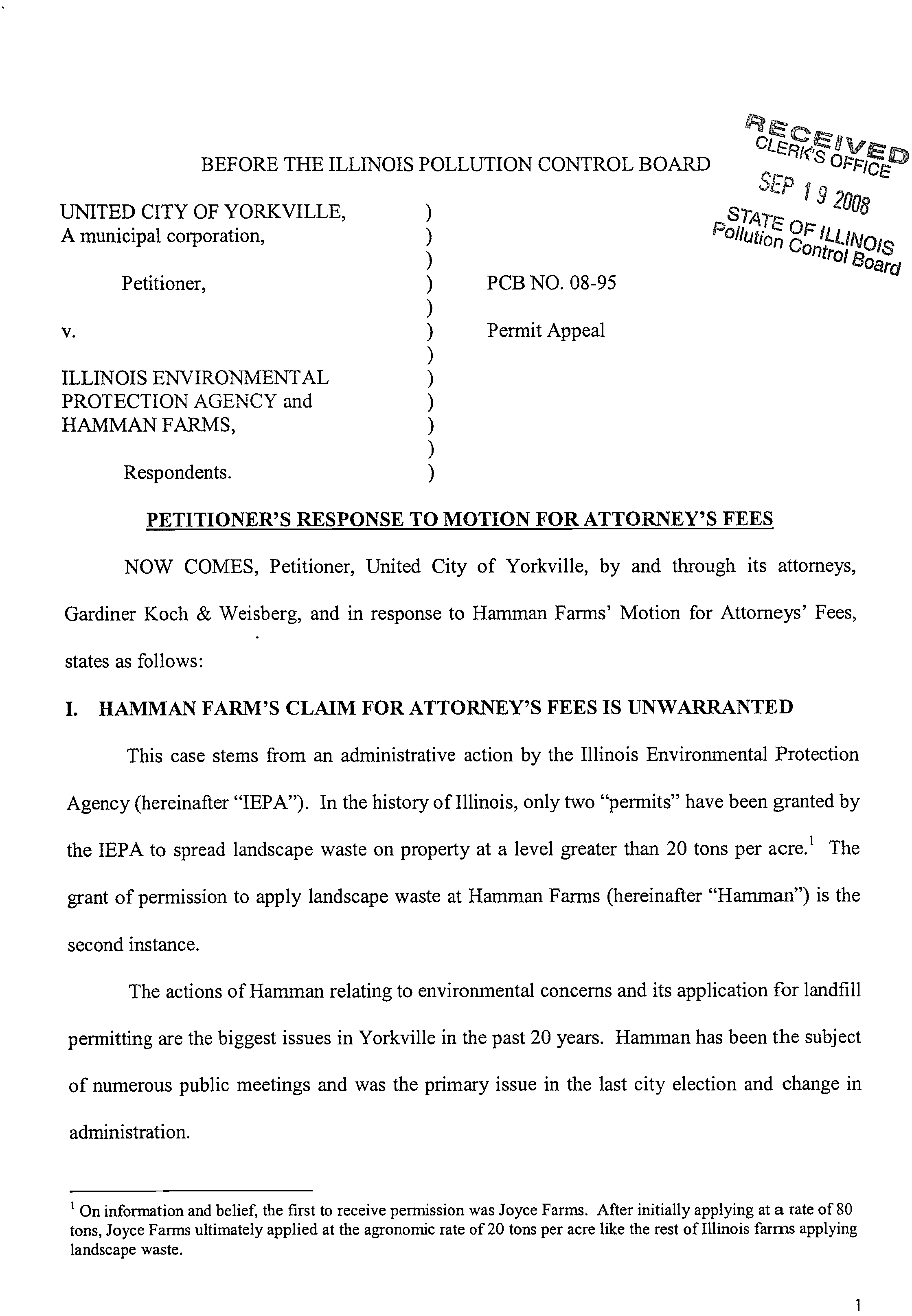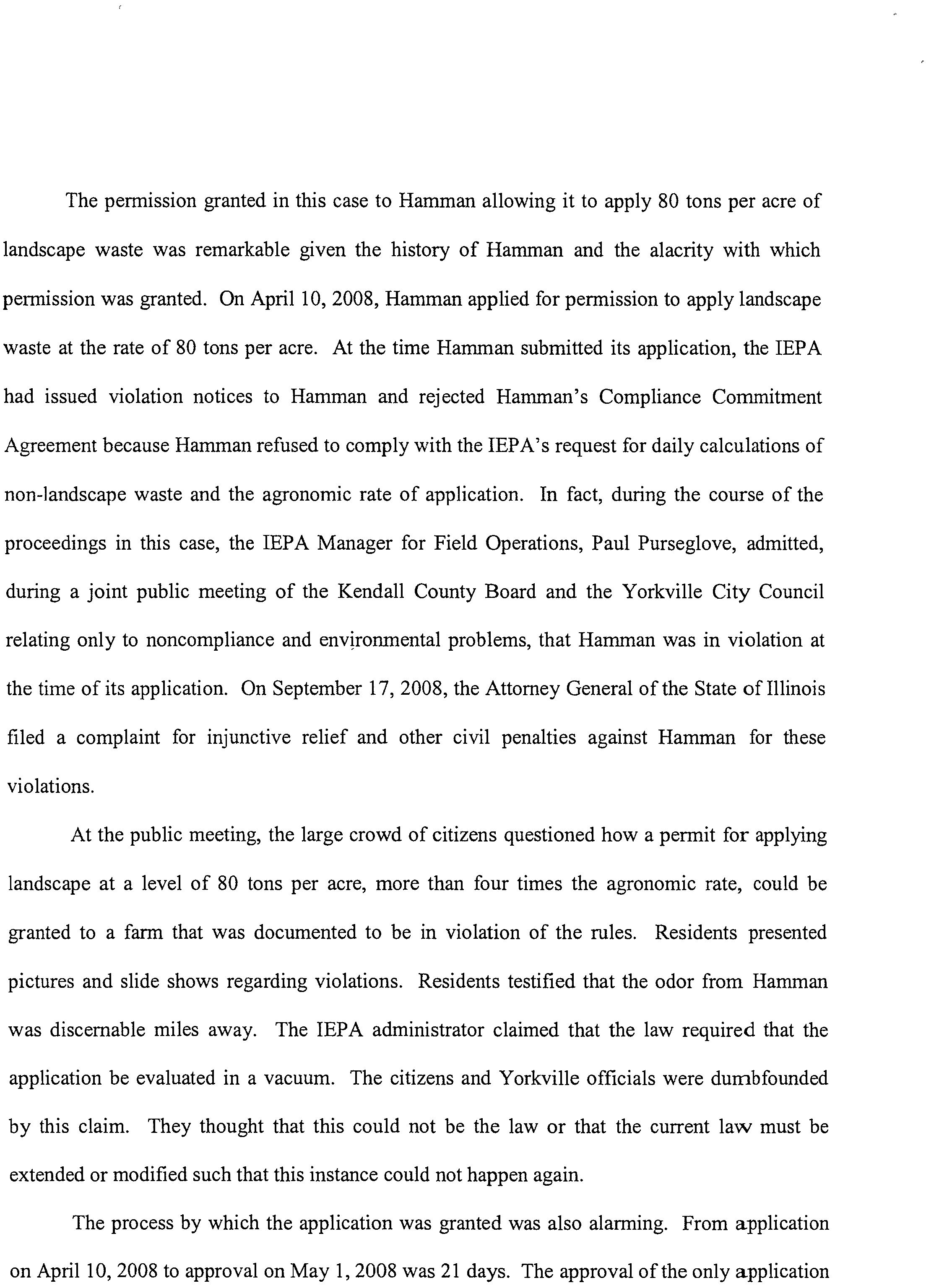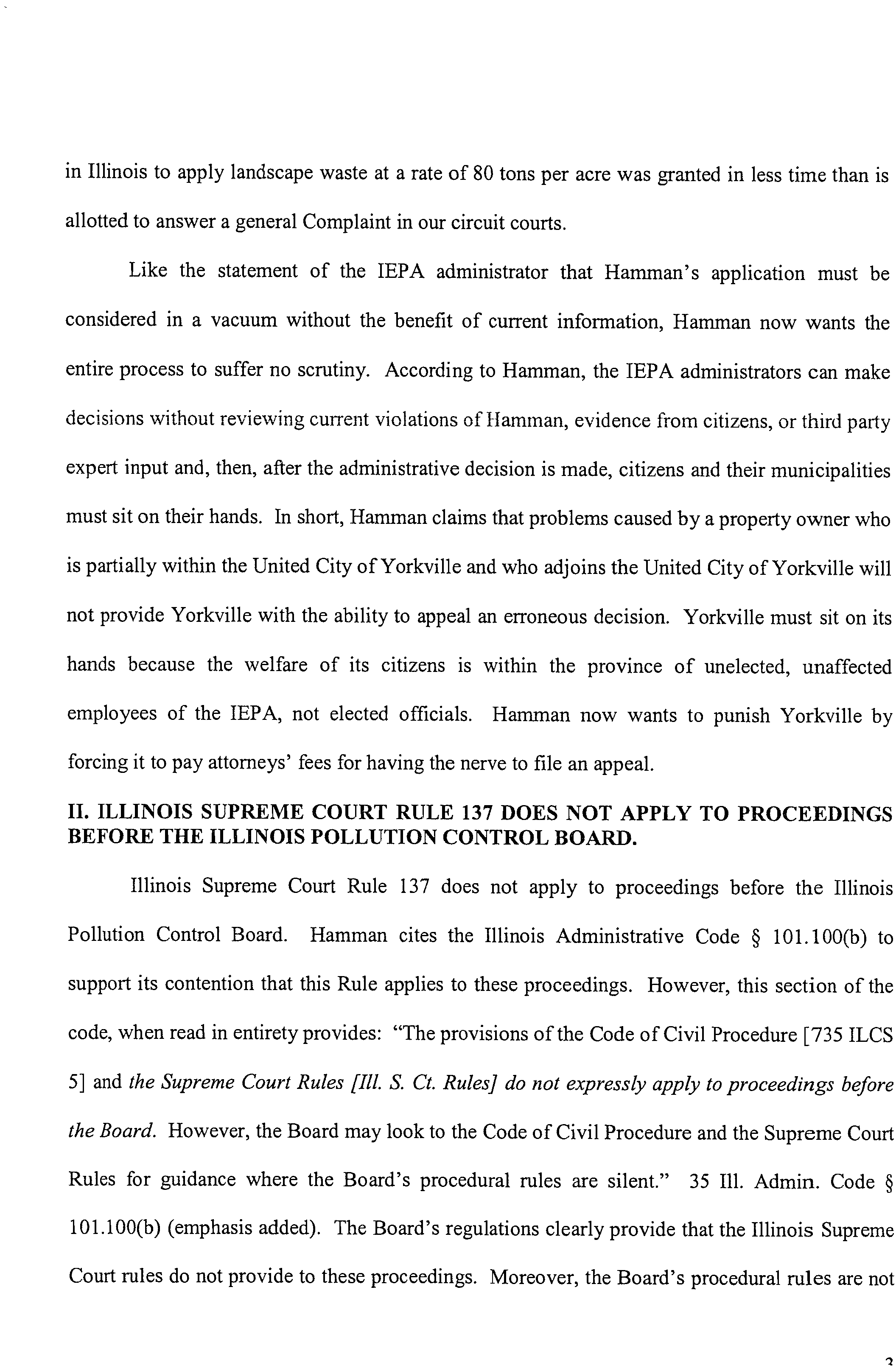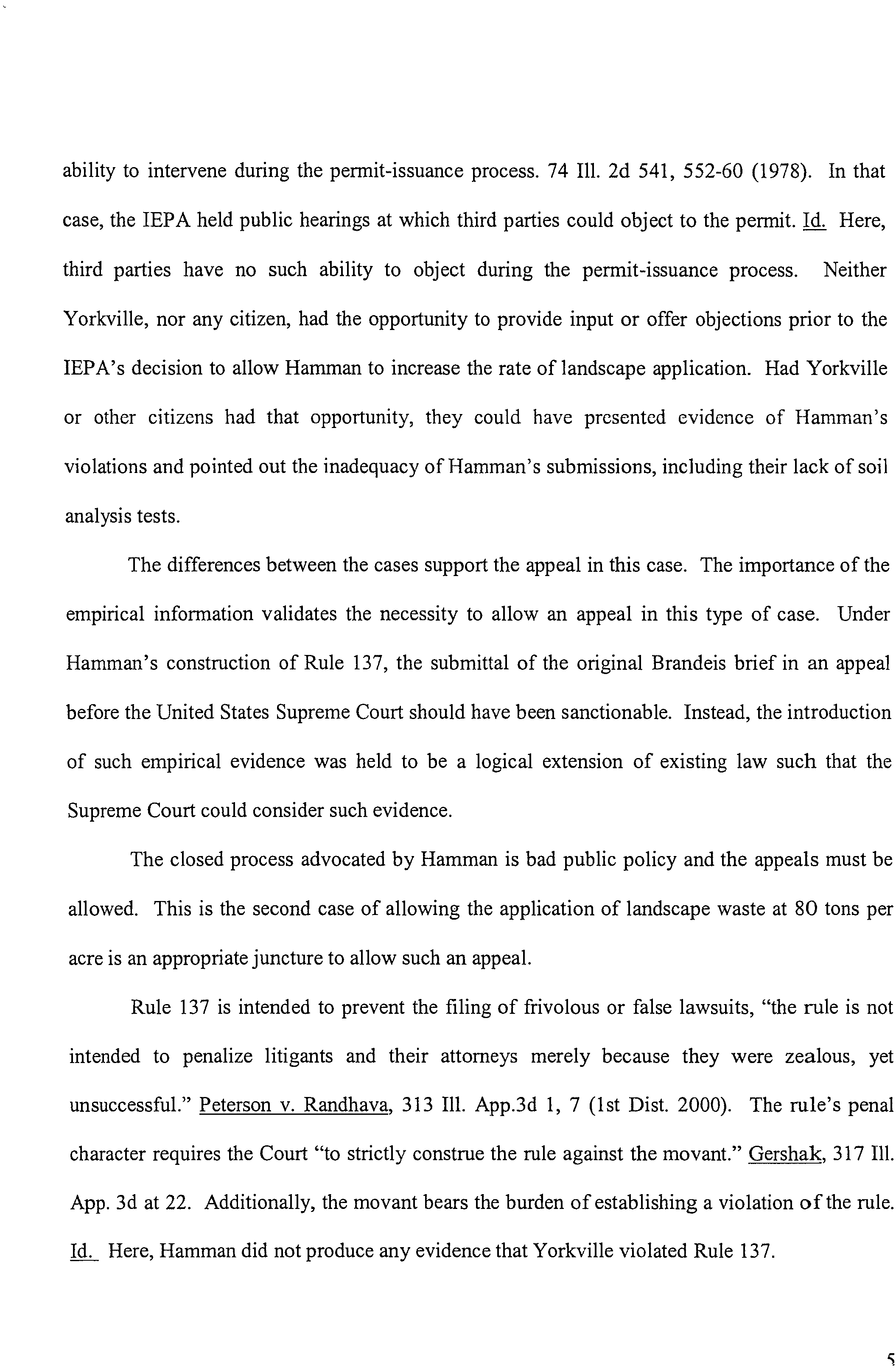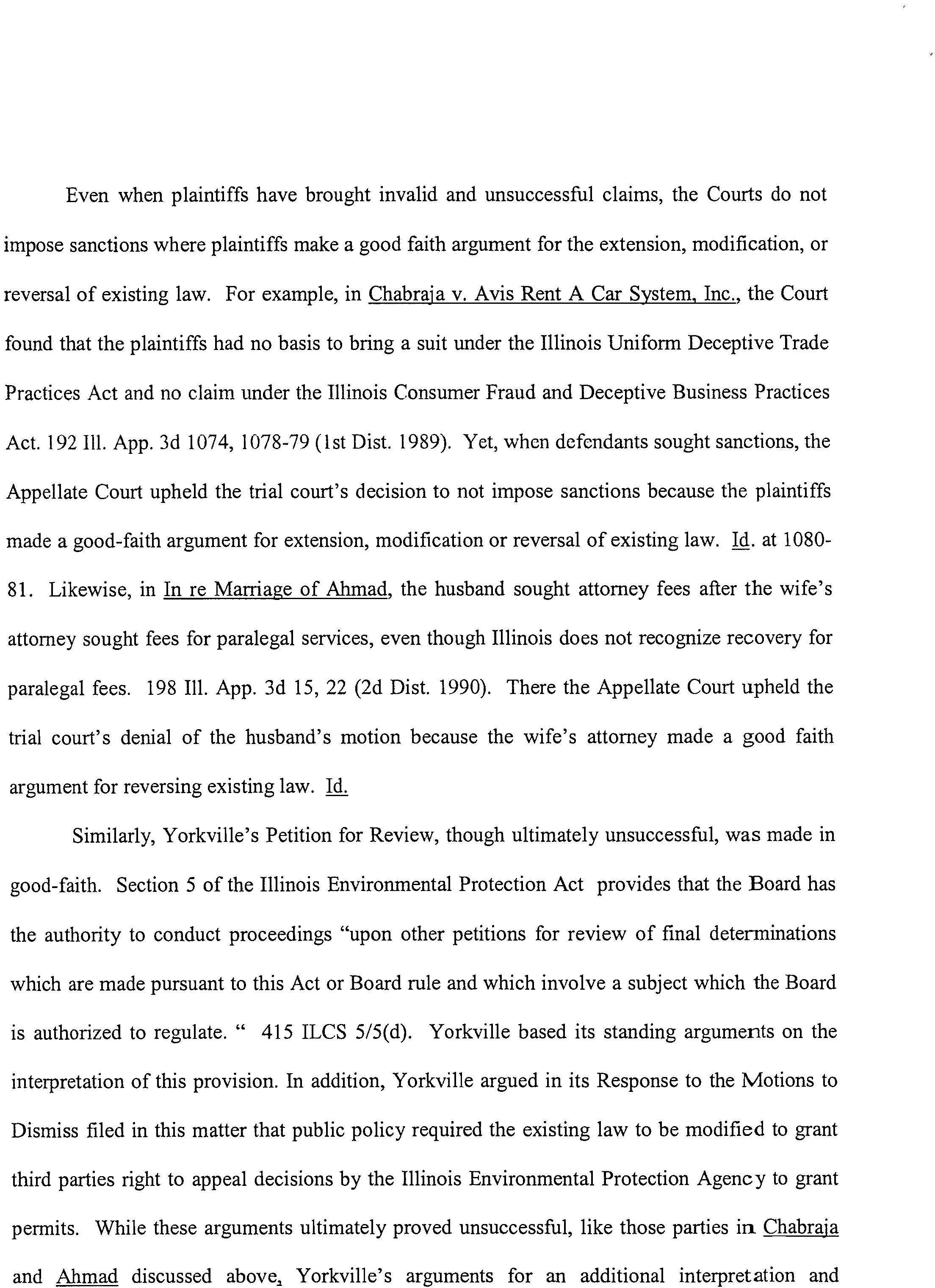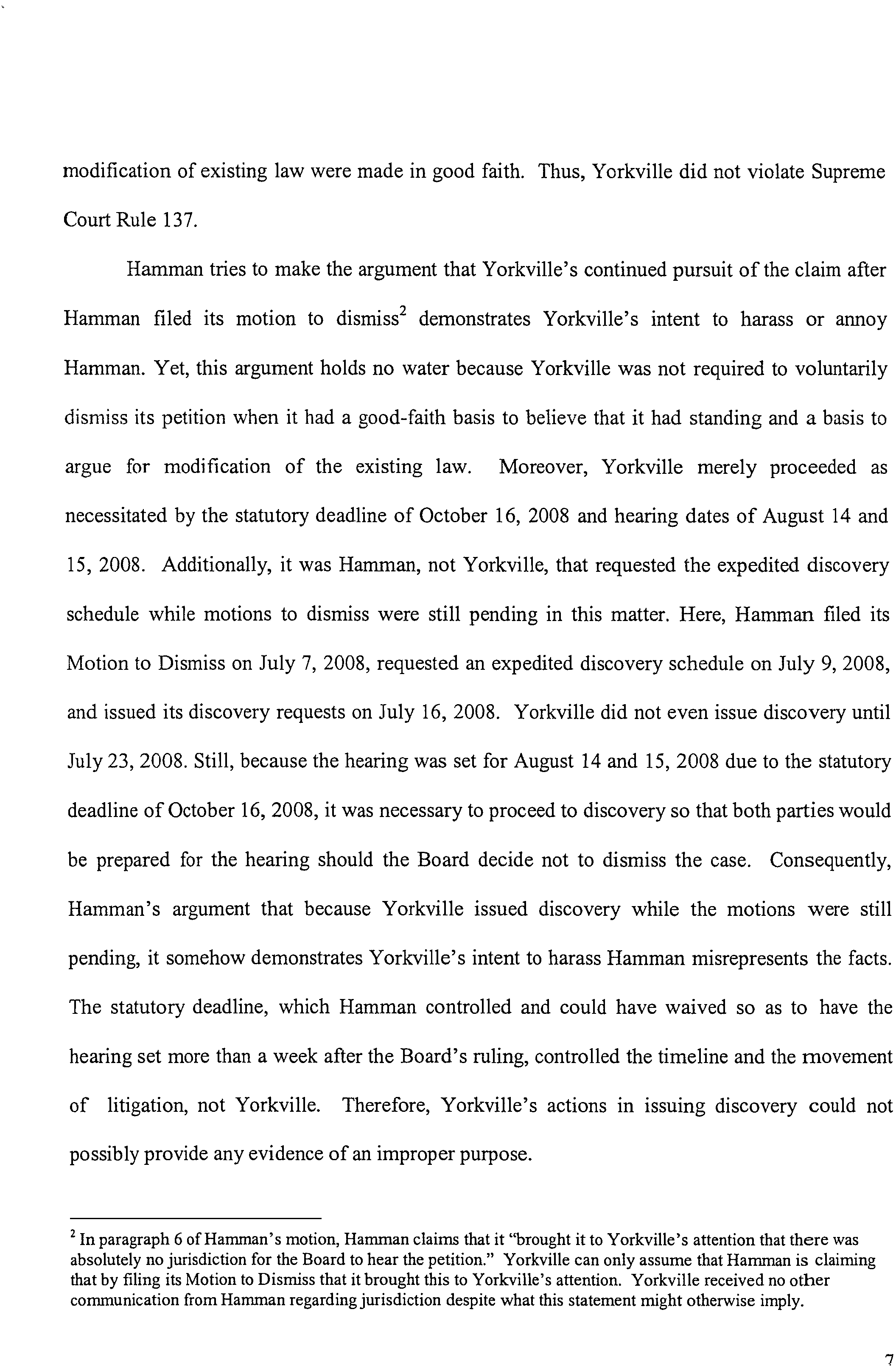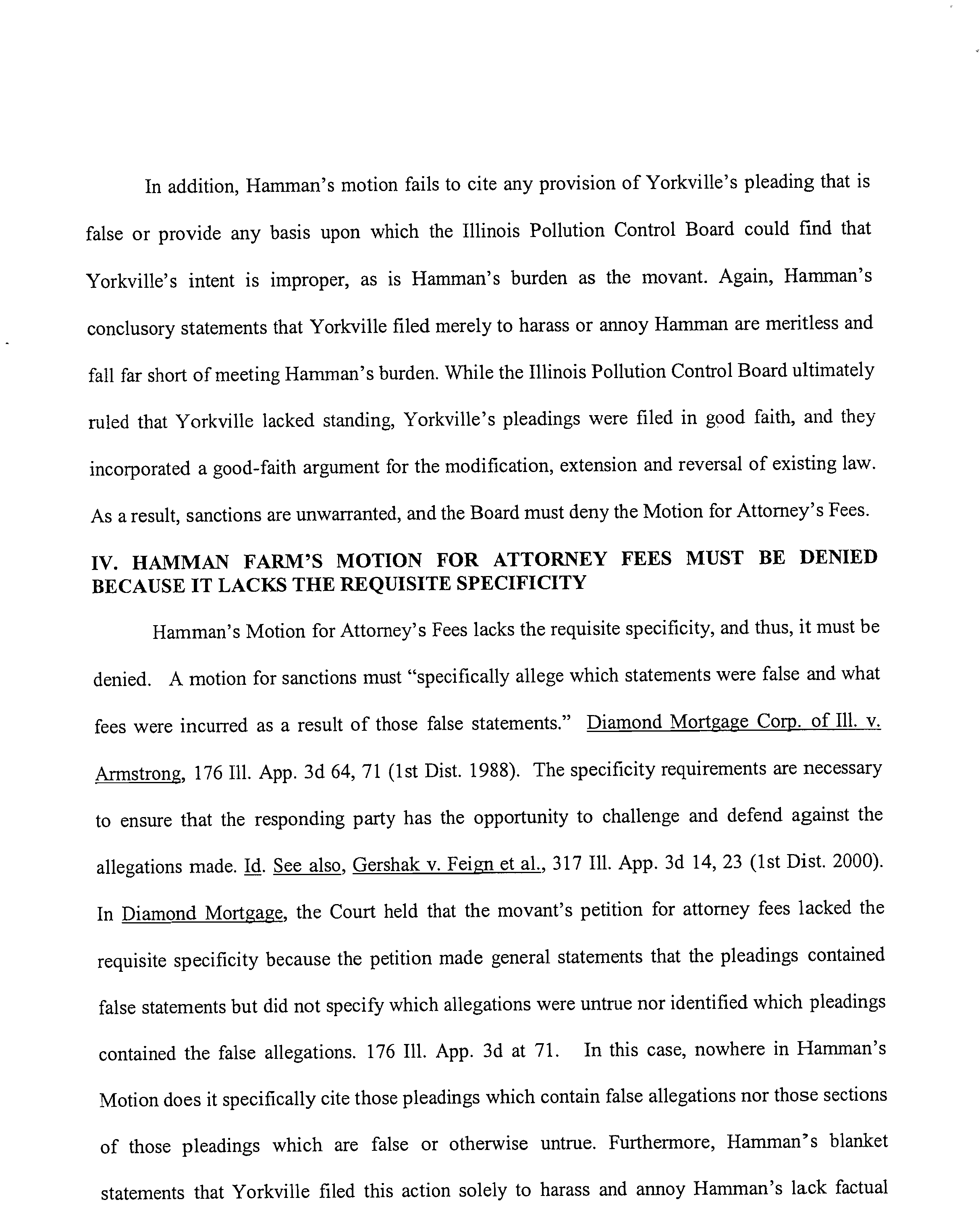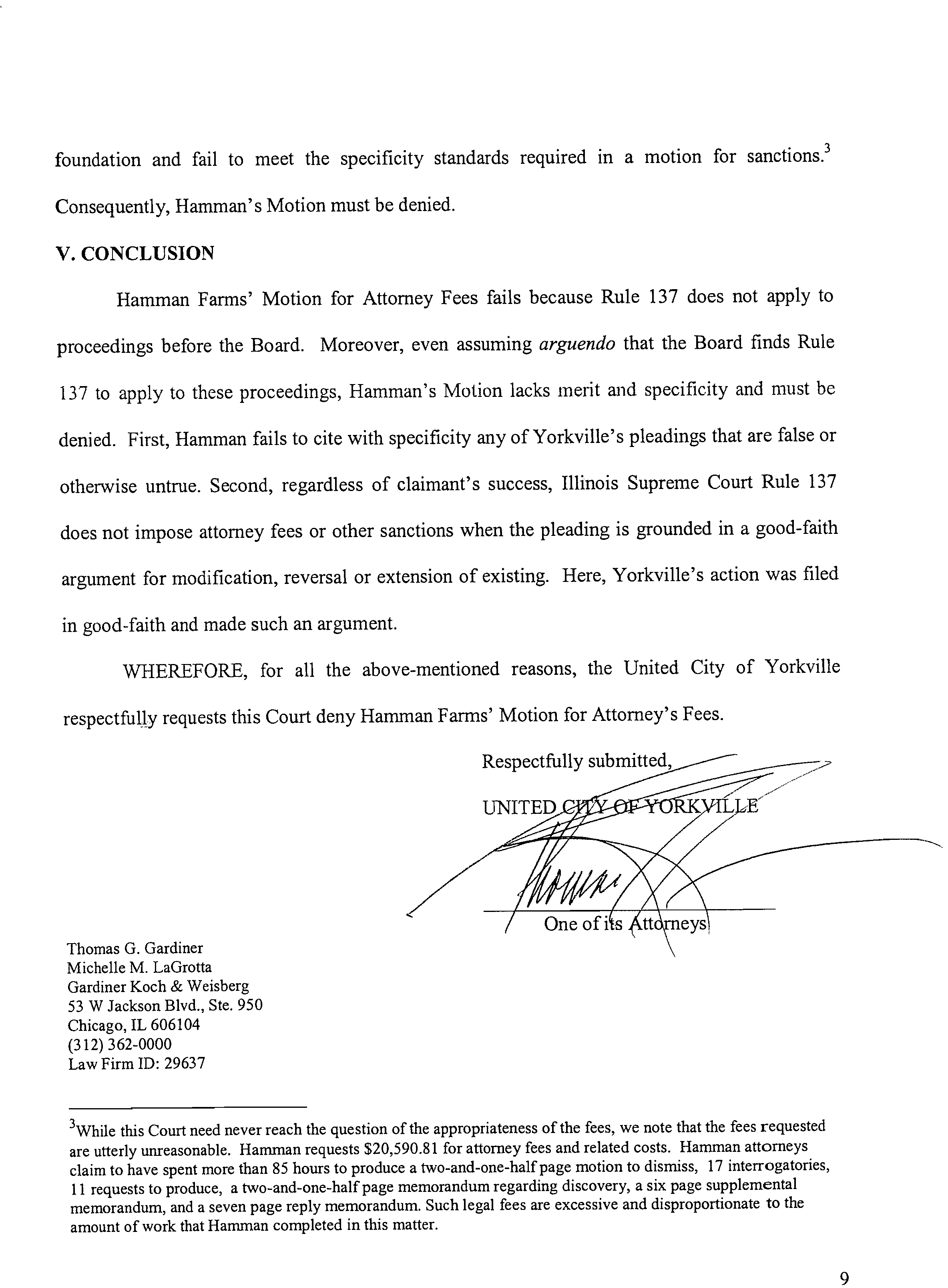BEFORE
THE
ILLINOIS
POLLUTION
CONTROL
BOARD
CLERK.S
OFFICE
UNITED
CITY OF
YORKVILLE,
A
MUNICIPAL
CORPORATION,
Petitioner,
)
)
PCB No.
08-95
ILLINOIS
ENVIRONMENTAL
PROTECTION
AGENCY,
and
HAMMAN
FARMS,
Respondents.
NOTICE OF
FILING
TO:
SEE PERSONS
ON
ATTACHED
SERVICE
LIST
PLEASE
TAKE
NOTICE
that I have
today
filed
with the
Office
of Clerk
of
the
Illinois
Pollution
Control
Board,
an original
and nine
copies
each of
PETITIONER’S
RESPONSE
TO
MOTION
FOR
ATTORNEY’S
FEES,
copies
of which are
herewith
served upon
you.
Dated: September
19,
2008
Thomas
G.
Gardiner
Michelle
M.
LaGrotta
GARDINER
KOCH
&
WEISBERG
53 W
Jackson
Blvd.,
Ste.
950
Chicago,
IL
60604
(312)
362-0000
Atty
ID:
29637
)
)
V.
SEP
192008
STATE
OF
ILLINOiS
POlItj
Control
Board
)
Appeal of
Agency
Decision
)
)
)
)
)
Respectfully
UNITED
THIS
FILING
IS SUBMITTED
ON RECYCLED
PAPER
CERTIFICATE
OF SERVICE
I, Thomas
G.
Gardiner, the undersigned certify
that on September 19, 2008, I
have
served
the
attached PETITIONER’S RESPONSE TO MOTION
FOR ATTORNEY’S FEES, upon:
Mr. John T. Therriault, Assistant Clerk
- Illinois
Pollution
Control Board
100
West Randolph Street
James R. Thompson Center, Suite 11-500
Chicago,
Illinois
60601-3218
(via hand delivery)
Bradley P. Halloran
Hearing Officer
Illinois
Pollution Control Board
James R.
Thompson Center, Ste. 22-500
100
W
Randolph
Street
Chicago, IL
60601
(via hand delivery)
Michelle M. Ryan
Division
of Legal Counsel
Illinois
Environmental Protection Agency
1021 North Grand Avenue
East
P.O.
Box
19276
Springfield,
IL 62794-9276
(via
email
to:
Michelle.Ryanillinois.gov
and U.S.
Mail)
Charles F.
Heisten
Nicola
A.
Nelson
Hinshaw
&
Culbertson
100 Park Avenue
P.O. Box 1389
Rockford, IL 61105-1389
(via
email to:
NNelson@hinshawlaw.com
and U.S.
CL,I
BEFORE
THE
ILLINOIS
POLLUTION CONTROL
BOARD
SEP
70
UNITED
CITY
OF
YORKVILLE,
)
ST4T
‘
2008
A
municipal corporation,
)
PoIIutiO
g4
LLI,
01
)
Petitioner,
)
PCB
NO.
08-95
)
v.
)
Permit
Appeal
)
ILLINOIS
ENVIRONMENTAL
)
PROTECTION
AGENCY
and
)
HAMMAN
FARMS,
)
)
Respondents.
)
PETITIONER’S
RESPONSE
TO
MOTION
FOR
ATTORNEY’S
FEES
NOW
COMES,
Petitioner, United
City
of Yorkville,
by
and
through
its
attorneys,
Gardiner
Koch
&
Weisberg,
and in
response
to
Hamman
Farms’
Motion
for Attorneys’
Fees,
states
as follows:
I.
HAMMAN
FARM’S
CLAIM
FOR
ATTORNEY’S
FEES
IS
UNWARRANTED
This
case stems
from
an
administrative action
by the
Illinois
Environmental
Protection
Agency
(hereinafter
“IEPA”).
In the
history
of
Illinois,
only
two
“permits”
have
been
granted
by
the IEPA
to
spread
landscape
waste
on
property
at a level
greater
than
20 tons
per
acre.
1
The
grant
of
permission
to
apply
landscape
waste
at
Hamman
Farms
(hereinafter
“Hamman”)
is
the
second
instance.
The
actions
of Hamman
relating
to
environmental
concerns
and its
application
for
landfill
permitting
are the
biggest
issues
in
Yorkville
in
the
past 20
years.
Hamman
has
been
the
subject
of
numerous
public
meetings
and was
the
primary
issue
in the last
city
election
and
change
in
administration.
On
information
and
belief,
the first
to
receive
permission
was
Joyce
Farms.
After
initially
applying
at
a
rate
of 80
tons,
Joyce
Farms
ultimately
applied
at the
agronomic
rate
of 20
tons per
acre like
the rest
of
Illinois
farms
applying
landscape
waste.
The permission granted in this case to
Hamman allowing it to apply
80 tons
per acre of
landscape
waste
was remarkable given
the
history
of Hamman and the
alacrity
with which
permission
was
granted. On
April 10, 2008, Hamman applied for permission
to apply
landscape
waste at the rate of 80 tons per acre. At the time
Hamman submitted its application, the IEPA
had
issued violation notices to Hamman and
rejected Hamman’s
Compliance
Commitment
Agreement
because Hamman refused to comply with the IEPA’s request
for daily calculations of
non-landscape waste and the agronomic rate
of application. In fact, during the course of
the
proceedings in this case, the IEPA Manager for Field Operations,
Paul Purseglove,
admitted,
during
a
joint public meeting of the Kendall County
Board and the Yorkville City Council
relating only to
noncompliance
and
environmental
problems, that Hamman was
in
violation
at
the time of its application. On September 17,
2008,
the Attorney General of the State of Illinois
filed a
complaint for injunctive relief and other civil
penalties against Hamman
for
these
violations.
At the
public meeting,
the
large crowd
of citizens questioned how a permit for applying
landscape at a level of 80 tons per acre, more than four times the agronomic
rate,
could
be
granted to a farm
that was documented to
be in violation of the rules. Residents presented
pictures and slide shows regarding violations. Residents testified
that the odor from Hamman
was discernable
miles away.
The IEPA administrator claimed
that the
law required
that the
application be
evaluated
in a
vacuum.
The
citizens and
Yorkville
officials
were
dumbfounded
by
this claim. They thought that this could not be the law
or that the current law must be
extended
or modified such that
this
instance could
not happen again.
The
process
by which the
application was
granted was
also
alarming.
From
application
on April 10, 2008 to
approval
on May 1, 2008 was 21 days.
The approval of the only
application
in
Illinois
to apply
landscape
waste
at
a
rate of
80 tons
per
acre was
granted
in
less time
than
is
allotted
to
answer
a
general
Complaint
in our
circuit
courts.
Like
the
statement
of
the
IEPA
administrator
that
Hamman’s
application
must
be
considered
in
a
vacuum
without
the
benefit
of
current
information,
Hamman
now
wants
the
entire
process
to
suffer
no scrutiny.
According
to Hamman,
the IEPA
administrators
can
make
decisions
without
reviewing
current
violations
of Hamman,
evidence
from
citizens,
or
third
party
expert
input
and,
then,
after the
administrative
decision
is
made,
citizens
and
their
municipalities
must
sit
on
their
hands.
In short,
Hamman
claims
that
problems
caused
by
a property
owner
who
is partially
within
the
United
City
of
Yorkville
and who
adjoins
the
United
City
of Yorkville
will
not
provide
Yorkville
with
the
ability
to appeal
an
erroneous
decision.
Yorkville
must
sit
on
its
hands
because
the welfare
of
its
citizens
is
within
the
province
of
unelected,
unaffected
employees
of
the JEPA,
not
elected
officials.
Haniman
now
wants
to
punish
Yorkville
by
forcing
it to
pay
attorneys’
fees
for
having
the nerve
to
file
an appeal.
II.
ILLINOIS
SUPREME
COURT
RULE
137 DOES
NOT
APPLY
TO PROCEEDINGS
BEFORE
THE
ILLINOIS
POLLUTION
CONTROL
BOARD.
Illinois
Supreme
Court
Rule
137 does
not apply
to
proceedings
before
the Illinois
Pollution
Control
Board.
Hamman
cites
the
Illinois
Administrative
Code
§
101.100(b)
to
support
its
contention
that
this
Rule
applies
to these
proceedings.
However,
this
section
of
the
code,
when
read
in entirety
provides:
“The
provisions
of
the Code
of
Civil
Procedure
[735 ILCS
5] and
the Supreme
Court
Rules
[Ill.
S. Ct.
Rules]
do not
expressly
apply
to
proceedings
before
the Board.
However,
the
Board
may
look to
the
Code
of Civil
Procedure
and the
Supreme
Court
Rules
for
guidance
where
the
Board’s
procedural
rules
are
silent.”
35
Ill. Admin.
Code
§
101.100(b)
(emphasis
added).
The
Board’s
regulations
clearly
provide
that
the
Illinois
Supreme
Court
rules
do
not
provide
to
these proceedings.
Moreover,
the
Board’s
procedural
rules
are
not
even
silent
on the issue of
sanctions as
the Board’s rules include
an entire section
on
sanctions
in
§101.800.
Had the Board
sought
to adopt
a provision similar to
Rule 137, it
would have
included
such a provision in
§101.800,
a SubPart entitled “Sanctions.”
Notably,
the Board
omitted
from
its list of
sanctions
attorney’s fees
in
§101.800.
As
a
result, Harnman’s
Motion
for
Attorney’s
Fees is
improper
and must be denied.
III.
THE
MOTION
FOR
ATTORNEY’S
FEES
MUST BE
DENIED BECAUSE
YORKVILLE
ACTED
GOOD
FAITH
AND
WITHOUT
AN IMPROPER
PURPOSE
Even
assuming
arguendo
that
the
Board finds Illinois
Supreme Court
Rule 137
applies
to
its proceedings,
Hamman’s
Motion
must be
denied because
Yorkville
acted in
good faith. Rule
137
provides that a
court may impose
appropriate
sanctions
if a pleading
is not
warranted
by
existing
law or a good-faith
argument
for
the extension,
modification,
or
reversal
of
existing law,
and
that it is
not
interposed
for any improper
purpose, such
as to harass or to cause
unnecessary
delay or
needless
increase in the cost
of
litigation.
In the
Motion
for Attorney’s
Fees,
Hamman
cites one case
for its claim that
longstanding
law prevented
Yorkville
from filing a
petition for review. Hamman
does not cite
the
Landfill,
Inc. v. PCB case directly,
but instead
uses
the
“See”
citation form. The”
See” citation
form
means:
“used
instead
of ‘no signal’
when the proposition
is not directly stated
by the
cited
authority but
obviously
follows from it; there
is an inferential step
between the authority
cited
and
the
proposition
it supports.”
The Bluebook, p.46;
Eighteenth Edition.
By this
citation
form,
Hamman
admits
that
the appeal is not
in
direct
contravention
of
existing
law.
Hamman
offers
no
citation
of any
other
case for its claim
that
Yorkville
acted
in
bad
faith.
Even the
Landfill,
Inc.
case allows for an
extension of the law.
In Landfill,
the Illinois
Supreme
Court
ruled that the
Illinois Pollution Control
Board could not
issue rules
that grant
third-party appeal
rights of decisions
to
grant sanitary
landfill
permits in
light of the
third party’s
ability
to intervene during the permit-issuance process.
74 Ill. 2d 541, 552-60
(1978).
In that
case,
the IEPA held
public hearings at which
third
parties could
object to the permit. Id. Here,
third parties have
no
such ability to
object during the permit-issuance
process.
Neither
Yorkville,
nor any
citizen, had
the opportunity
to provide input or offer
objections
prior to
the
IEPA’s decision to allow Hamman to increase the
rate of landscape application. Had Yorkville
or other citizens had
that opportunity,
they could have presented evidence
of
Hamman’s
violations
and
pointed out the inadequacy of Hamman’s
submissions, including their lack of soil
analysis tests.
The
differences
between the cases support
the appeal in this case. The importance of the
empirical information
validates
the
necessity
to allow an appeal in this
type
of case. Under
Hamman’s
construction
of
Rule 137, the submittal
of the original Brandeis brief in
an appeal
before the United States
Supreme
Court should have been sanctionable. Instead, the introduction
of such empirical
evidence was held
to
be
a logical extension of existing law such
that
the
Supreme Court
could consider such evidence.
The
closed
process advocated
by
Hamman
is bad public policy and the appeals
must
be
allowed.
This is the second case of allowing the application of landscape waste at 80
tons
per
acre is an
appropriate juncture to allow such an appeal.
Rule 137 is intended to prevent the filing of frivolous
or
false
lawsuits, “the rule is not
intended
to
penalize litigants and their attorneys merely
because they were
zealous,
yet
unsuccessful.” Peterson v. Randhava, 313 Ill. App.3d 1,
7
(1st
Dist. 2000). The
rule’s
penal
character
requires the Court “to strictly construe the rule against
the movant.” Gershak,
317 Ill.
App.
3d
at 22.
Additionally, the movant bears the burden of establishing
a
violation of the rule.
Id.
Here, Hamman did not produce any evidence that Yorkville violated
Rule 137.
c
Even
when
plaintiffs
have
brought
invalid
and
unsuccessful claims,
the Courts
do not
impose
sanctions
where plaintiffs make
a good
faith
argument for the extension,
modification,
or
reversal of existing law.
For example,
in Chabraja
v. Avis Rent A
Car System,
Inc.,
the Court
found that
the plaintiffs
had no basis to bring
a suit under the Illinois
Uniform
Deceptive
Trade
Practices
Act
and
no claim
under
the
Illinois Consumer
Fraud
and
Deceptive Business
Practices
Act. 192 111. App.
3d 1074,
1078-79 (1st Dist.
1989).
Yet, when
defendants sought
sanctions,
the
Appellate
Court
upheld
the trial court’s
decision to not
impose
sanctions
because the plaintiffs
made
a
good-faith
argument
for extension,
modification
or
reversal of existing
law.
.
at
1080-
81. Likewise,
in In re
Marriage of Ahmad,
the husband sought
attorney
fees after
the
wife’s
attorney
sought
fees for paralegal
services, even though
Illinois
does
not recognize
recovery for
paralegal fees.
198 III.
App. 3d 15, 22 (2d
Dist. 1990). There
the Appellate
Court upheld
the
trial court’s
denial
of the husband’s
motion because
the wife’s attorney
made a
good
faith
argument for
reversing existing
law.
j
Similarly,
Yorkville’s
Petition for Review,
though
ultimately
unsuccessful,
was made
in
good-faith.
Section
5
of
the
Illinois
Environmental Protection
Act provides
that the Board
has
the
authority
to
conduct
proceedings
“upon other petitions
for
review
of
final determinations
which are made
pursuant to
this Act or
Board
rule and which involve
a subject
which
the
Board
is
authorized to
regulate. “
415 ILCS
5/5(d).
Yorkville based
its standing
arguments on the
interpretation
of
this
provision.
In addition,
Yorkville argued in
its
Response to the
Motions to
Dismiss
filed in this
matter that public
policy
required
the existing law
to be
modified
to grant
third
parties right to appeal
decisions by
the Illinois Environmental
Protection
Agency
to grant
permits.
While these
arguments ultimately
proved unsuccessful,
like those
parties in
Chabraja
and
Ahmad discussed
above
1
Yorkville’s arguments
for an additional
interpretation
and
modification
of existing
law were
made in good faith.
Thus, Yorkville
did
not
violate
Supreme
Court
Rule
137.
Hamman tries to make the argument
that Yorkville’s
continued
pursuit of the claim after
Hamman
filed its
motion
to dismiss
2demonstrates
Yorkville’s intent
to
harass or annoy
Hamman.
Yet, this argument
holds no water because Yorkville
was not required
to
voluntarily
dismiss
its
petition when it had
a good-faith basis to
believe that it had standing and a basis
to
argue for modification of the existing law.
Moreover,
Yorkville merely proceeded as
necessitated by the statutory deadline of October
16, 2008 and hearing
dates of
August 14 and
15,
2008.
Additionally, it was Hamman, not
Yorkville, that requested the expedited discovery
schedule
while motions
to
dismiss were
still pending in this matter.
Here,
Hamman
filed its
Motion to Dismiss on July 7, 2008, requested an expedited
discovery schedule on July 9, 2008,
and issued its discovery requests on July 16, 2008.
Yorkville did not even issue discovery until
July
23, 2008. Still,
because the hearing was
set for August 14 and
15, 2008 due to
the statutory
deadline
of
October 16, 2008, it was necessary to proceed
to discovery so that both
parties
would
be prepared
for the hearing should the
Board decide not to dismiss
the case. Consequently,
Hamman’s
argument that because Yorkville issued
discovery while
the motions were still
pending, it somehow
demonstrates
Yorkville’s intent to harass
Hamman misrepresents
the
facts.
The statutory
deadline, which Hamman controlled
and could have waived
so as to
have the
hearing set more
than a week
after
the
Board’s
ruling, controlled
the timeline and the
movement
of
litigation, not Yorkville. Therefore, Yorkville’s
actions in issuing
discovery
could
not
possibly
provide
any evidence of
an
improper
purpose.
2
In paragraph 6
of Hamman’ s motion, Hamman claims
that it “brought it
to Yorkville
‘s
attention that
there was
absolutely
no jurisdiction for the Board
to
hear the petition.”
Yorkville can
only
assume that Hamman is
claiming
that by filing its
Motion to Dismiss that
it brought this to Yorkville’s attention.
Yorkville received
no
other
communication from Hamman regarding jurisdiction
despite what this
statement might otherwise imply.
7
In
addition,
Hamman’s
motion
fails
to
cite any
provision
of
Yorkville’s
pleading
that
is
false or
provide
any basis
upon
which
the
Illinois
Pollution
Control
Board
could
find
that
Yorkville’s
intent
is
improper,
as
is
Hamman’s
burden
as
the
movant.
Again,
Hamman’s
conclusory
statements
that
Yorkville
filed
merely
to
harass
or
annoy Hamman
are
meritless
and
fall
far
short
of
meeting
Hamman’s
burden.
While the
Illinois
Pollution
Control
Board
ultimately
ruled
that
Yorkville
lacked
standing,
Yorkville’s
pleadings
were filed
in
good
faith,
and
they
incorporated
a
good-faith
argument
for
the
modification,
extension
and
reversal
of
existing
law.
As
a result,
sanctions
are
unwarranted,
and
the
Board
must
deny the
Motion
for
Attorney’s
Fees.
IV.
HAMMAN
FARM’S
MOTION
FOR
ATTORNEY
FEES
MUST
BE
DEMED
BECAUSE
IT
LACKS
THE
REQUISITE
SPECIFICITY
Hamman’s
Motion
for
Attorney’s
Fees
lacks the
requisite
specificity,
and
thus,
it
must be
denied.
A
motion
for
sanctions
must
“specifically
allege
which
statements
were
false
and
what
fees
were
incurred
as
a
result
of
those
false
statements.”
Diamond
Mortgage
Corp.
of
Ill.
v.
Armstrong,
176
Ill.
App.
3d
64,
71(1st
Dist.
1988).
The
specificity
requirements
are
necessary
to
ensure
that the
responding
party
has
the opportunity
to
challenge
and
defend
against
the
allegations
made.
.
See
also,
Gershak
v.
Feign
et
a!.,
317
Ill.
App.
3d
14, 23
(1st
Dist. 2000).
In
Diamond
Mortgage,
the
Court
held
that
the
movant’s
petition
for
attorney
fees
lacked
the
requisite
specificity
because
the
petition
made
general
statements
that
the
pleadings
contained
false
statements
but
did
not
specify
which
allegations
were
untrue nor
identified
which
pleadings
contained
the
false
allegations.
176
Ill.
App.
3d
at
71.
In
this case,
nowhere
in
Hamman’s
Motion
does
it
specifically
cite
those
pleadings
which
contain
false allegations
nor
those
sections
of
those
pleadings
which
are
false
or
otherwise
untrue.
Furthermore,
Hamman’s
blanket
statements
that
Yorkville
filed this
action
solely
to
harass
and
annoy
Hamman’s
lack
factual
foundation
and
fail to
meet
the
specificity
standards
required
in
a
motion
for
sanctions.
3
Consequently,
Hamman’s
Motion
must
be
denied.
V.
CONCLUSION
Hamman
Farms’
Motion
for
Attorney
Fees
fails
because
Rule
137
does
not
apply
to
proceedings
before
the
Board.
Moreover,
even
assuming
arguendo
that
the
Board
finds
Rule
137
to
apply
to
these
proceedings,
Hamman’s
Motion
lacks
merit
and
specificity
and
must
be
denied.
First,
Hamman
fails
to cite
with
specificity
any
of Yorkville’s
pleadings
that
are
false
or
otherwise
untrue. Second,
regardless
of
claimant’s
success, Illinois
Supreme
Court
Rule
137
does
not
impose
attorney
fees
or
other
sanctions
when
the
pleading
is
grounded
in
a
good-faith
argument
for
modification,
reversal or
extension
of
existing.
Here,
Yorkville’s
action
was
filed
in
good-faith
and
made
such
an
argument.
WHEREFORE,
for
all
the
above-mentioned
reasons,
the
United
City
of
Yorkville
respectfully
requests
this
Court
deny
Hamman
Farms’
Motion
for
Attorney’s
Fees.
Thomas
G.
Gardiner
Michelle
M.
LaGrotta
Gardiner
Koch
&
Weisberg
53
W
Jackson
Blvd.,
Ste.
950
Chicago,
IL
606104
(312)
362-0000
Law
Firm
ID:
29637
3
WhiIe
this
Court
need
never
reach
the
question
of
the
appropriateness
of
the
fees,
we
note
that
the
fees
requested
are
utterly
unreasonable.
Hamman
requests
$20,590.81
for
attorney
fees
and
related
costs.
Hamman
attorneys
claim
to
have
spent
more
than
85
hours
to
produce
a
two-and-one-half
page
motion
to
dismiss,
17
interrogatories,
11
requests
to
produce,
a
two-and-one-half
page
memorandum
regarding
discovery,
a
six
page
supplemental
memorandum,
and
a
seven
page
reply
memorandum.
Such
legal
fees
are
excessive
and
disproportionate
to
the
amount
of
work
that
Hamman
completed
in
this
matter.
9
